Human Resource Development Report: Sun Court Ltd Training Analysis
VerifiedAdded on 2020/07/23
|17
|5090
|46
Report
AI Summary
This report delves into the multifaceted realm of Human Resource Development (HRD), focusing on the application of various learning styles and training methodologies within an organizational context, using Sun Court Ltd as a case study. The report commences by comparing different learning styles, including those proposed by Honey and Mumford, and Kolb, and subsequently elucidates the role of the learning curve and the importance of transferring learning to the workplace. It then assesses the contribution of these learning styles and theories in planning and designing effective learning events. The analysis extends to comparing training needs across different staff levels, evaluating the advantages and disadvantages of various training methods, and planning a systematic approach to training and development. Furthermore, the report outlines evaluation techniques, conducts an evaluation of a training event, and reviews the success of the evaluation methods employed. Finally, the report explores the role of government in training, development, and lifelong learning, and examines the impact of the competency movement, specifically in the context of Sun Court Ltd's training and development program. The report provides a comprehensive understanding of HRD, and its practical application in a real-world business setting.
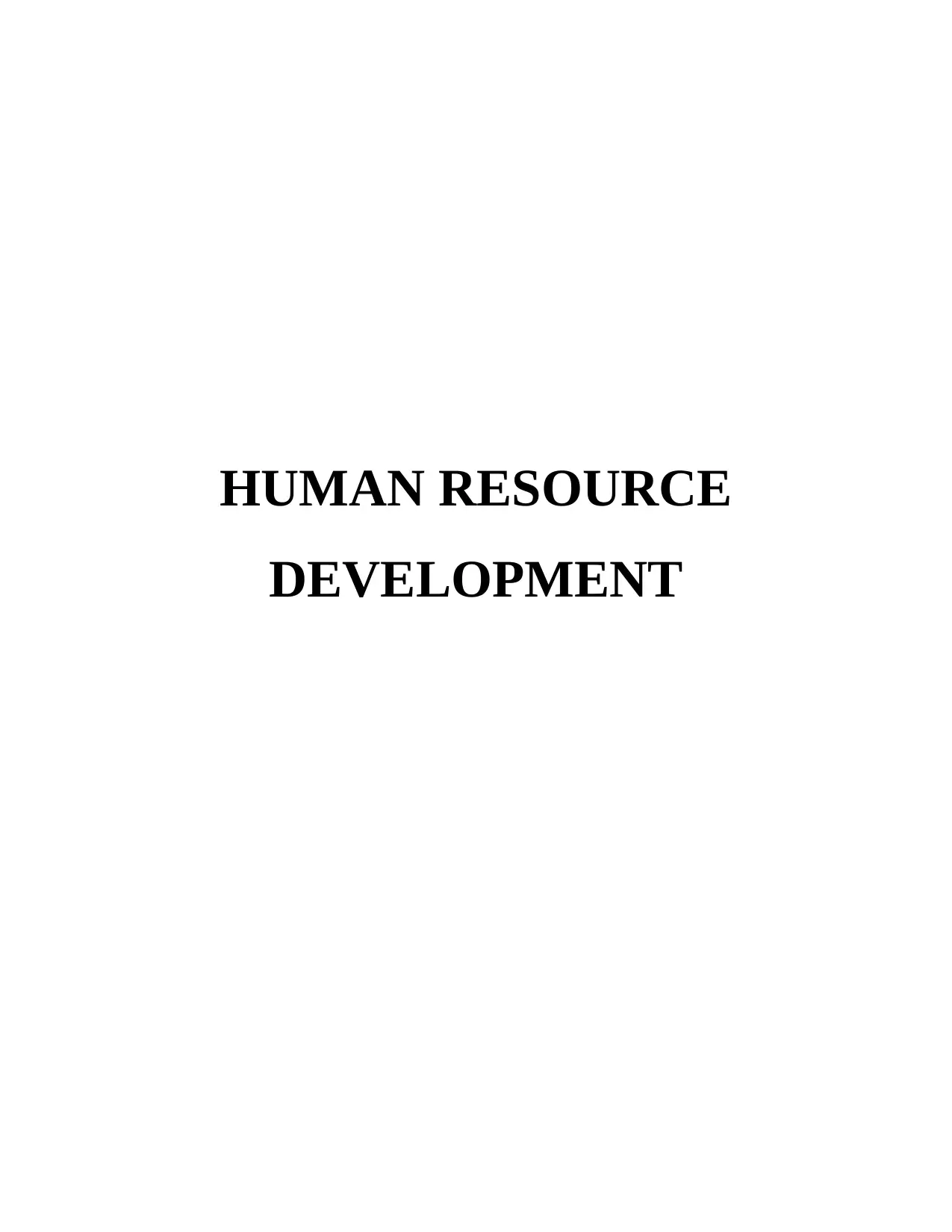
HUMAN RESOURCE
DEVELOPMENT
DEVELOPMENT
Paraphrase This Document
Need a fresh take? Get an instant paraphrase of this document with our AI Paraphraser
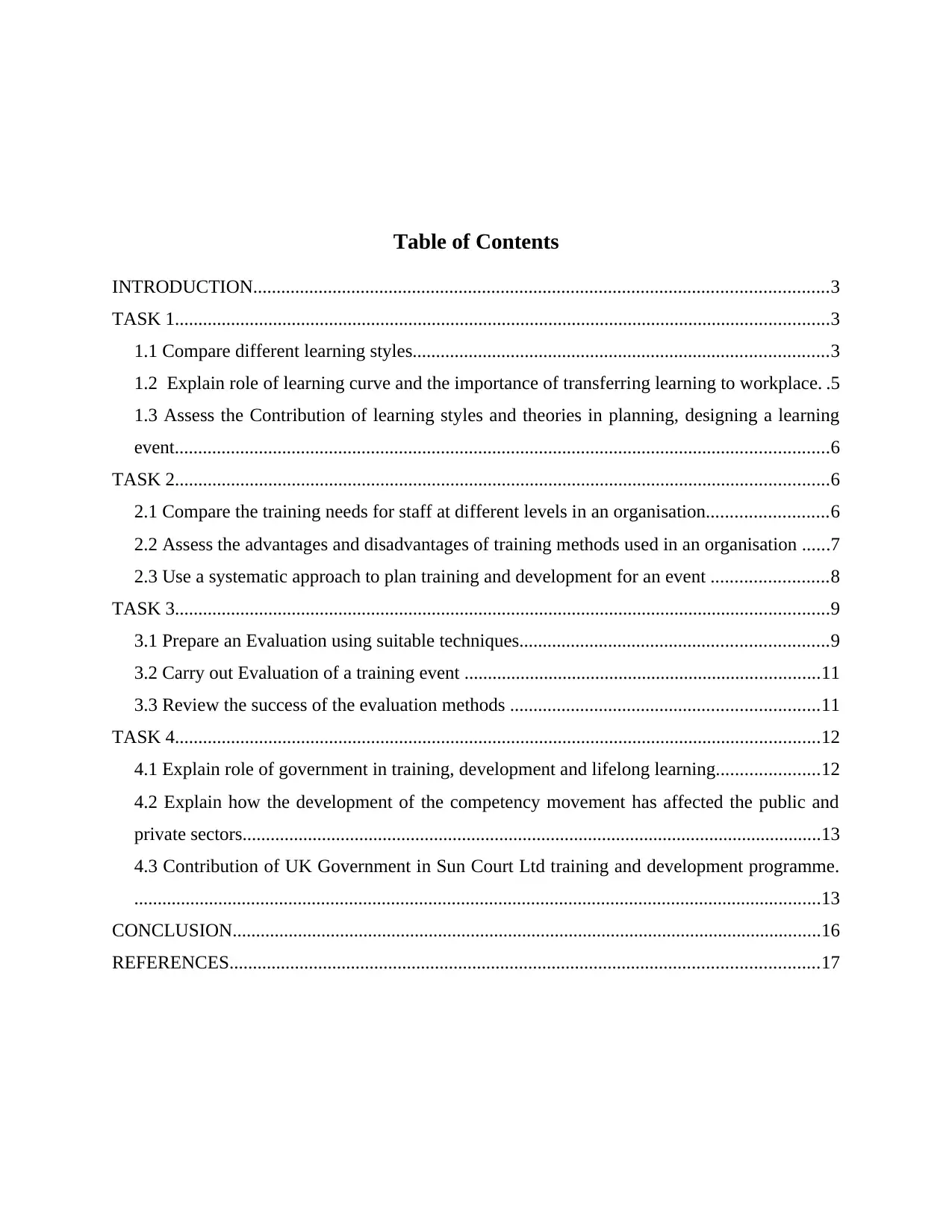
Table of Contents
INTRODUCTION...........................................................................................................................3
TASK 1............................................................................................................................................3
1.1 Compare different learning styles.........................................................................................3
1.2 Explain role of learning curve and the importance of transferring learning to workplace. .5
1.3 Assess the Contribution of learning styles and theories in planning, designing a learning
event............................................................................................................................................6
TASK 2............................................................................................................................................6
2.1 Compare the training needs for staff at different levels in an organisation..........................6
2.2 Assess the advantages and disadvantages of training methods used in an organisation ......7
2.3 Use a systematic approach to plan training and development for an event .........................8
TASK 3............................................................................................................................................9
3.1 Prepare an Evaluation using suitable techniques..................................................................9
3.2 Carry out Evaluation of a training event ............................................................................11
3.3 Review the success of the evaluation methods ..................................................................11
TASK 4..........................................................................................................................................12
4.1 Explain role of government in training, development and lifelong learning......................12
4.2 Explain how the development of the competency movement has affected the public and
private sectors............................................................................................................................13
4.3 Contribution of UK Government in Sun Court Ltd training and development programme.
...................................................................................................................................................13
CONCLUSION..............................................................................................................................16
REFERENCES..............................................................................................................................17
INTRODUCTION...........................................................................................................................3
TASK 1............................................................................................................................................3
1.1 Compare different learning styles.........................................................................................3
1.2 Explain role of learning curve and the importance of transferring learning to workplace. .5
1.3 Assess the Contribution of learning styles and theories in planning, designing a learning
event............................................................................................................................................6
TASK 2............................................................................................................................................6
2.1 Compare the training needs for staff at different levels in an organisation..........................6
2.2 Assess the advantages and disadvantages of training methods used in an organisation ......7
2.3 Use a systematic approach to plan training and development for an event .........................8
TASK 3............................................................................................................................................9
3.1 Prepare an Evaluation using suitable techniques..................................................................9
3.2 Carry out Evaluation of a training event ............................................................................11
3.3 Review the success of the evaluation methods ..................................................................11
TASK 4..........................................................................................................................................12
4.1 Explain role of government in training, development and lifelong learning......................12
4.2 Explain how the development of the competency movement has affected the public and
private sectors............................................................................................................................13
4.3 Contribution of UK Government in Sun Court Ltd training and development programme.
...................................................................................................................................................13
CONCLUSION..............................................................................................................................16
REFERENCES..............................................................................................................................17
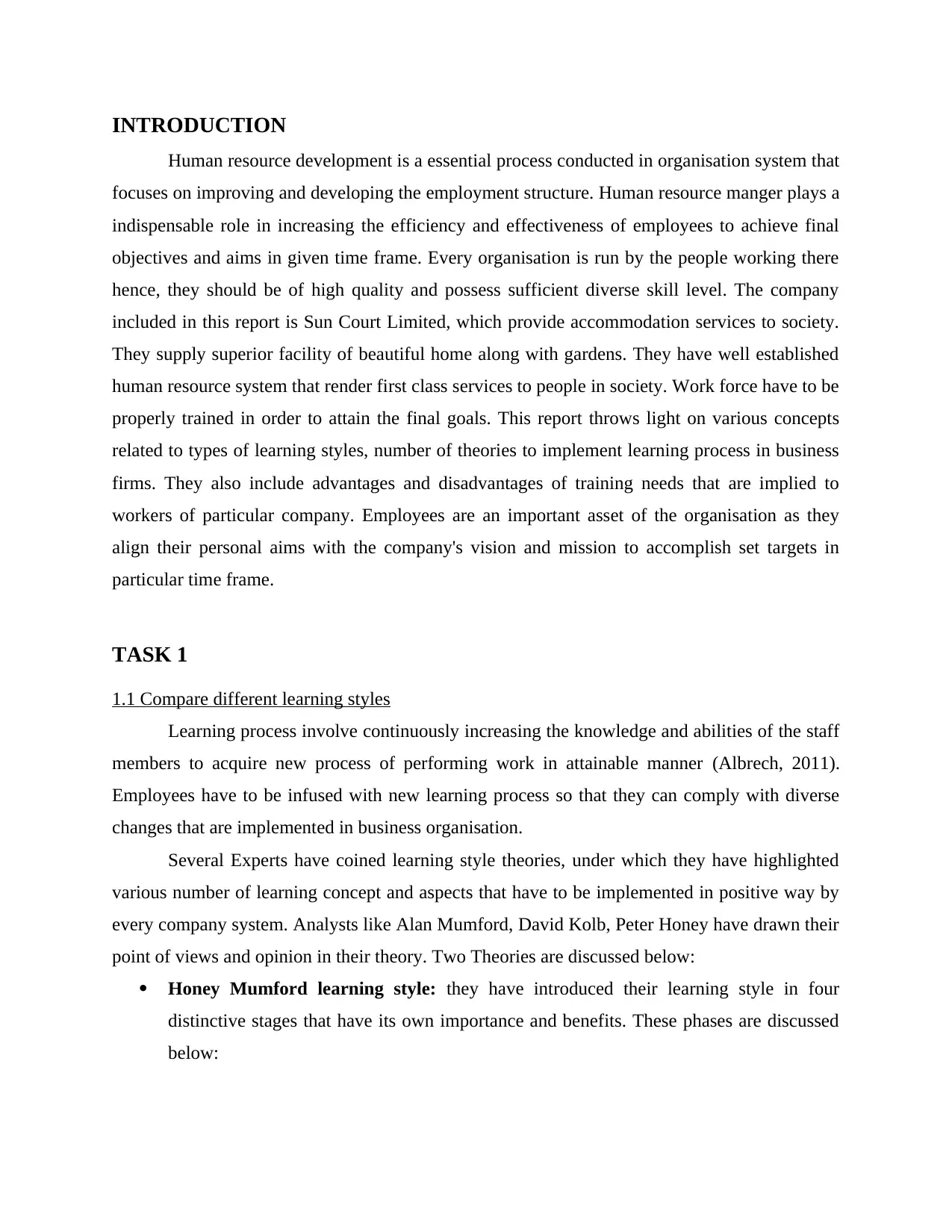
INTRODUCTION
Human resource development is a essential process conducted in organisation system that
focuses on improving and developing the employment structure. Human resource manger plays a
indispensable role in increasing the efficiency and effectiveness of employees to achieve final
objectives and aims in given time frame. Every organisation is run by the people working there
hence, they should be of high quality and possess sufficient diverse skill level. The company
included in this report is Sun Court Limited, which provide accommodation services to society.
They supply superior facility of beautiful home along with gardens. They have well established
human resource system that render first class services to people in society. Work force have to be
properly trained in order to attain the final goals. This report throws light on various concepts
related to types of learning styles, number of theories to implement learning process in business
firms. They also include advantages and disadvantages of training needs that are implied to
workers of particular company. Employees are an important asset of the organisation as they
align their personal aims with the company's vision and mission to accomplish set targets in
particular time frame.
TASK 1
1.1 Compare different learning styles
Learning process involve continuously increasing the knowledge and abilities of the staff
members to acquire new process of performing work in attainable manner (Albrech, 2011).
Employees have to be infused with new learning process so that they can comply with diverse
changes that are implemented in business organisation.
Several Experts have coined learning style theories, under which they have highlighted
various number of learning concept and aspects that have to be implemented in positive way by
every company system. Analysts like Alan Mumford, David Kolb, Peter Honey have drawn their
point of views and opinion in their theory. Two Theories are discussed below:
Honey Mumford learning style: they have introduced their learning style in four
distinctive stages that have its own importance and benefits. These phases are discussed
below:
Human resource development is a essential process conducted in organisation system that
focuses on improving and developing the employment structure. Human resource manger plays a
indispensable role in increasing the efficiency and effectiveness of employees to achieve final
objectives and aims in given time frame. Every organisation is run by the people working there
hence, they should be of high quality and possess sufficient diverse skill level. The company
included in this report is Sun Court Limited, which provide accommodation services to society.
They supply superior facility of beautiful home along with gardens. They have well established
human resource system that render first class services to people in society. Work force have to be
properly trained in order to attain the final goals. This report throws light on various concepts
related to types of learning styles, number of theories to implement learning process in business
firms. They also include advantages and disadvantages of training needs that are implied to
workers of particular company. Employees are an important asset of the organisation as they
align their personal aims with the company's vision and mission to accomplish set targets in
particular time frame.
TASK 1
1.1 Compare different learning styles
Learning process involve continuously increasing the knowledge and abilities of the staff
members to acquire new process of performing work in attainable manner (Albrech, 2011).
Employees have to be infused with new learning process so that they can comply with diverse
changes that are implemented in business organisation.
Several Experts have coined learning style theories, under which they have highlighted
various number of learning concept and aspects that have to be implemented in positive way by
every company system. Analysts like Alan Mumford, David Kolb, Peter Honey have drawn their
point of views and opinion in their theory. Two Theories are discussed below:
Honey Mumford learning style: they have introduced their learning style in four
distinctive stages that have its own importance and benefits. These phases are discussed
below:
⊘ This is a preview!⊘
Do you want full access?
Subscribe today to unlock all pages.

Trusted by 1+ million students worldwide
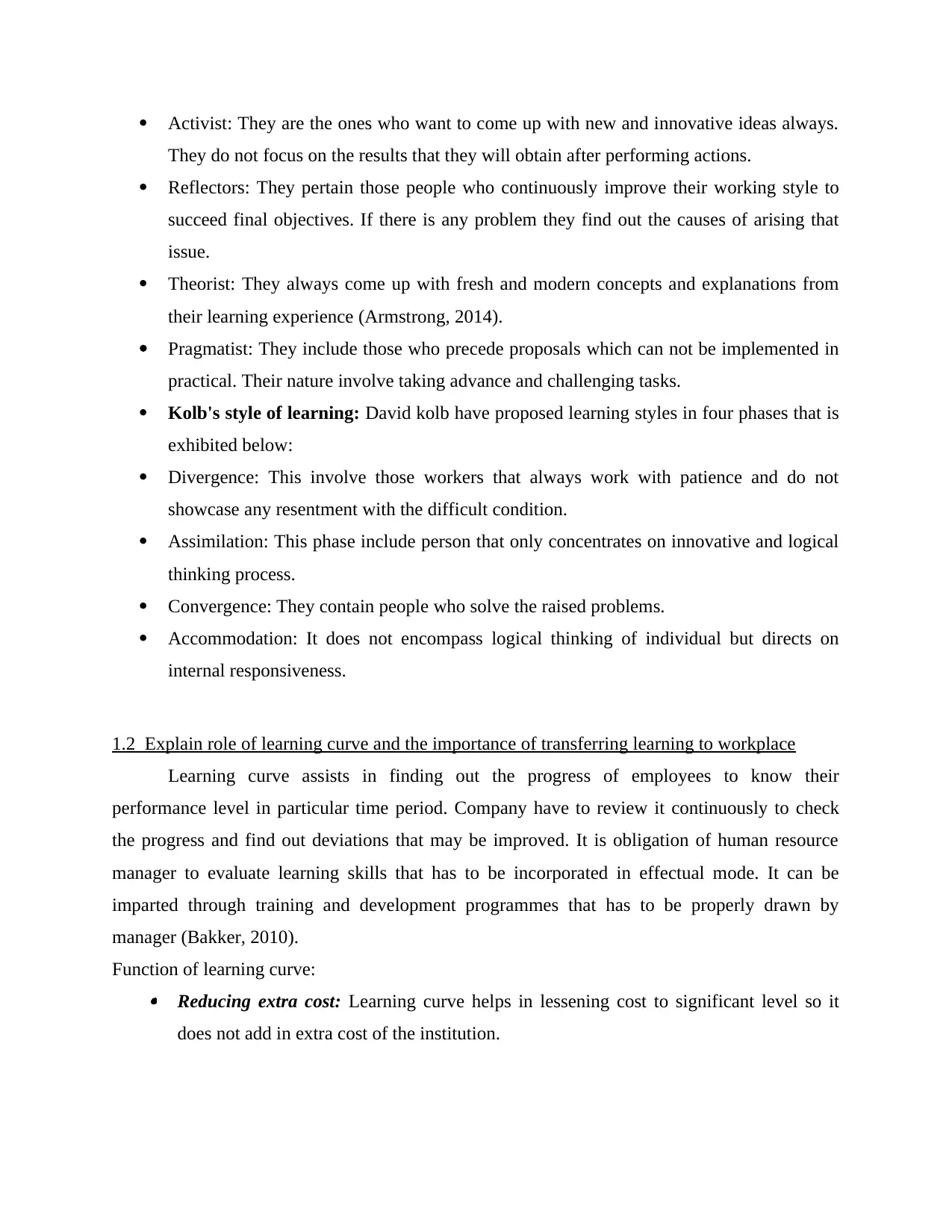
Activist: They are the ones who want to come up with new and innovative ideas always.
They do not focus on the results that they will obtain after performing actions.
Reflectors: They pertain those people who continuously improve their working style to
succeed final objectives. If there is any problem they find out the causes of arising that
issue.
Theorist: They always come up with fresh and modern concepts and explanations from
their learning experience (Armstrong, 2014).
Pragmatist: They include those who precede proposals which can not be implemented in
practical. Their nature involve taking advance and challenging tasks.
Kolb's style of learning: David kolb have proposed learning styles in four phases that is
exhibited below:
Divergence: This involve those workers that always work with patience and do not
showcase any resentment with the difficult condition.
Assimilation: This phase include person that only concentrates on innovative and logical
thinking process.
Convergence: They contain people who solve the raised problems.
Accommodation: It does not encompass logical thinking of individual but directs on
internal responsiveness.
1.2 Explain role of learning curve and the importance of transferring learning to workplace
Learning curve assists in finding out the progress of employees to know their
performance level in particular time period. Company have to review it continuously to check
the progress and find out deviations that may be improved. It is obligation of human resource
manager to evaluate learning skills that has to be incorporated in effectual mode. It can be
imparted through training and development programmes that has to be properly drawn by
manager (Bakker, 2010).
Function of learning curve: Reducing extra cost: Learning curve helps in lessening cost to significant level so it
does not add in extra cost of the institution.
They do not focus on the results that they will obtain after performing actions.
Reflectors: They pertain those people who continuously improve their working style to
succeed final objectives. If there is any problem they find out the causes of arising that
issue.
Theorist: They always come up with fresh and modern concepts and explanations from
their learning experience (Armstrong, 2014).
Pragmatist: They include those who precede proposals which can not be implemented in
practical. Their nature involve taking advance and challenging tasks.
Kolb's style of learning: David kolb have proposed learning styles in four phases that is
exhibited below:
Divergence: This involve those workers that always work with patience and do not
showcase any resentment with the difficult condition.
Assimilation: This phase include person that only concentrates on innovative and logical
thinking process.
Convergence: They contain people who solve the raised problems.
Accommodation: It does not encompass logical thinking of individual but directs on
internal responsiveness.
1.2 Explain role of learning curve and the importance of transferring learning to workplace
Learning curve assists in finding out the progress of employees to know their
performance level in particular time period. Company have to review it continuously to check
the progress and find out deviations that may be improved. It is obligation of human resource
manager to evaluate learning skills that has to be incorporated in effectual mode. It can be
imparted through training and development programmes that has to be properly drawn by
manager (Bakker, 2010).
Function of learning curve: Reducing extra cost: Learning curve helps in lessening cost to significant level so it
does not add in extra cost of the institution.
Paraphrase This Document
Need a fresh take? Get an instant paraphrase of this document with our AI Paraphraser

Lifting efficacy of each employees: organisation have to put continuous efforts to
increase the productivity and effectiveness of workers so that they can contribute best of
their abilities. Helps in planning process: Plans are drawn for future events that the business firm
have to reach in set time period. Thus, learning curve process guide management level
to frame successful plans.
Forecasting future cost structure: Finance is part and parcel for business transactions
hence, it is necessary to calculate cost associated with diverse working process.
Significance of transferring learning process in work place: Solving number of issues significantly: There are situations which result in conflicts
between workers working together, therefore introducing learning process will help in
removing such barriers. Allocation of finance in productive areas: Managers have to use finance in profitable
manner. This can be achieved only when learning process can be executed in proper
format (Bamberger, 2014). Reaching final targets: Learning process motivates each employee in business entity to
work according to objectives and rules of organisations. Hence, they have to inculcate
proper skills and knowledge to reach final path.
Adding value: Continuous learning helps in increasing the value of working process to
attain the best level.
1.3 Assess the Contribution of learning styles and theories in planning, designing a learning
event
Learning styles and theories aids in matching the actual performance with the standard
performance. There can be deviations that may occur due to some reasons hence, have to be
removed in order to work properly. Organisation introducing any learning process in their system
makes them work with more power and ability. Sun Court limited introduce several learning
theories and styles that helps in uplifting the skills and knowledge of each individual. Thus, it is
essential to introduce learning styles that fir best in the system. Human resource manager have to
examine number of options and choose best out of several alternatives.
increase the productivity and effectiveness of workers so that they can contribute best of
their abilities. Helps in planning process: Plans are drawn for future events that the business firm
have to reach in set time period. Thus, learning curve process guide management level
to frame successful plans.
Forecasting future cost structure: Finance is part and parcel for business transactions
hence, it is necessary to calculate cost associated with diverse working process.
Significance of transferring learning process in work place: Solving number of issues significantly: There are situations which result in conflicts
between workers working together, therefore introducing learning process will help in
removing such barriers. Allocation of finance in productive areas: Managers have to use finance in profitable
manner. This can be achieved only when learning process can be executed in proper
format (Bamberger, 2014). Reaching final targets: Learning process motivates each employee in business entity to
work according to objectives and rules of organisations. Hence, they have to inculcate
proper skills and knowledge to reach final path.
Adding value: Continuous learning helps in increasing the value of working process to
attain the best level.
1.3 Assess the Contribution of learning styles and theories in planning, designing a learning
event
Learning styles and theories aids in matching the actual performance with the standard
performance. There can be deviations that may occur due to some reasons hence, have to be
removed in order to work properly. Organisation introducing any learning process in their system
makes them work with more power and ability. Sun Court limited introduce several learning
theories and styles that helps in uplifting the skills and knowledge of each individual. Thus, it is
essential to introduce learning styles that fir best in the system. Human resource manager have to
examine number of options and choose best out of several alternatives.
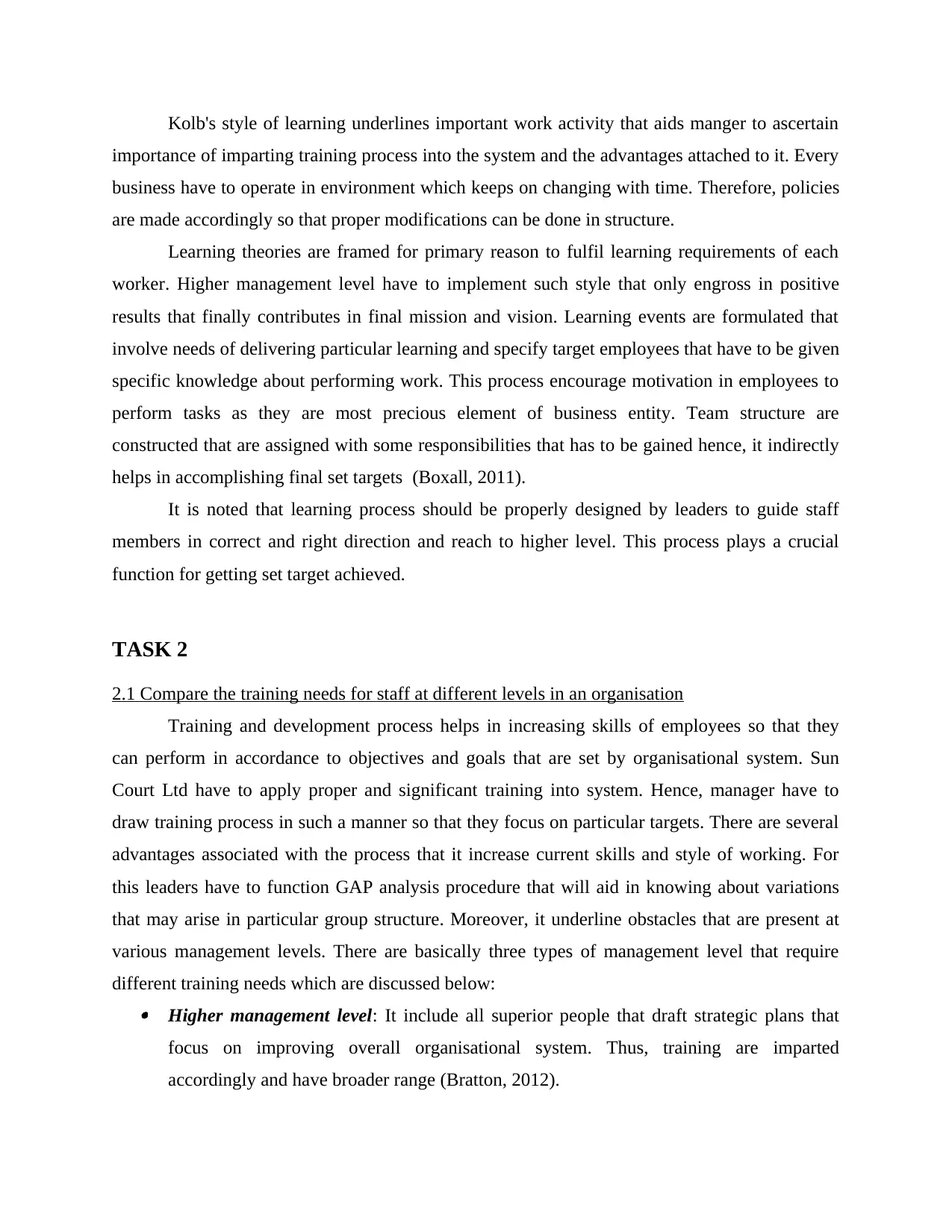
Kolb's style of learning underlines important work activity that aids manger to ascertain
importance of imparting training process into the system and the advantages attached to it. Every
business have to operate in environment which keeps on changing with time. Therefore, policies
are made accordingly so that proper modifications can be done in structure.
Learning theories are framed for primary reason to fulfil learning requirements of each
worker. Higher management level have to implement such style that only engross in positive
results that finally contributes in final mission and vision. Learning events are formulated that
involve needs of delivering particular learning and specify target employees that have to be given
specific knowledge about performing work. This process encourage motivation in employees to
perform tasks as they are most precious element of business entity. Team structure are
constructed that are assigned with some responsibilities that has to be gained hence, it indirectly
helps in accomplishing final set targets (Boxall, 2011).
It is noted that learning process should be properly designed by leaders to guide staff
members in correct and right direction and reach to higher level. This process plays a crucial
function for getting set target achieved.
TASK 2
2.1 Compare the training needs for staff at different levels in an organisation
Training and development process helps in increasing skills of employees so that they
can perform in accordance to objectives and goals that are set by organisational system. Sun
Court Ltd have to apply proper and significant training into system. Hence, manager have to
draw training process in such a manner so that they focus on particular targets. There are several
advantages associated with the process that it increase current skills and style of working. For
this leaders have to function GAP analysis procedure that will aid in knowing about variations
that may arise in particular group structure. Moreover, it underline obstacles that are present at
various management levels. There are basically three types of management level that require
different training needs which are discussed below: Higher management level: It include all superior people that draft strategic plans that
focus on improving overall organisational system. Thus, training are imparted
accordingly and have broader range (Bratton, 2012).
importance of imparting training process into the system and the advantages attached to it. Every
business have to operate in environment which keeps on changing with time. Therefore, policies
are made accordingly so that proper modifications can be done in structure.
Learning theories are framed for primary reason to fulfil learning requirements of each
worker. Higher management level have to implement such style that only engross in positive
results that finally contributes in final mission and vision. Learning events are formulated that
involve needs of delivering particular learning and specify target employees that have to be given
specific knowledge about performing work. This process encourage motivation in employees to
perform tasks as they are most precious element of business entity. Team structure are
constructed that are assigned with some responsibilities that has to be gained hence, it indirectly
helps in accomplishing final set targets (Boxall, 2011).
It is noted that learning process should be properly designed by leaders to guide staff
members in correct and right direction and reach to higher level. This process plays a crucial
function for getting set target achieved.
TASK 2
2.1 Compare the training needs for staff at different levels in an organisation
Training and development process helps in increasing skills of employees so that they
can perform in accordance to objectives and goals that are set by organisational system. Sun
Court Ltd have to apply proper and significant training into system. Hence, manager have to
draw training process in such a manner so that they focus on particular targets. There are several
advantages associated with the process that it increase current skills and style of working. For
this leaders have to function GAP analysis procedure that will aid in knowing about variations
that may arise in particular group structure. Moreover, it underline obstacles that are present at
various management levels. There are basically three types of management level that require
different training needs which are discussed below: Higher management level: It include all superior people that draft strategic plans that
focus on improving overall organisational system. Thus, training are imparted
accordingly and have broader range (Bratton, 2012).
⊘ This is a preview!⊘
Do you want full access?
Subscribe today to unlock all pages.

Trusted by 1+ million students worldwide

Middle management level: It involves those employees that execute work operations in
practical. Training process is provided to increase the working capability so that they lend
best of their efforts and capacity.
Lower management level: it holds all managers of different department that is directly
connected with workers to get the work done. Training is executed in respect to this
process. It only concentrates on increasing motivation so that they work along with
organisation.
Several types of training that are functioned to various levels of management: On the job training: it is imparted to employees while they are performing task at work
place. There are benefits attached to it, as they learn while doing work this helps them to
perform while learning. There are numerous methods of on the job training that include
job instruction training, job rotation or mentoring etc.
Off the Job training: It is provided to workers away from the work area. The best
process involved in this is management and executive development program.
2.2 Assess the advantages and disadvantages of training methods used in an organisation
There are number of methods of proving training managers have to study all the methods
and select best alternative that help in increasing productivity and efficiency. Manager of sun
court limited have to determine needs properly so that they can frame training events properly.
There are advantages and disadvantages of each training method that are mentioned below:
Advantages:
It is the plan of action that are enforced in Sun Court Limited that helps in making
decision appropriately.
Training aids in accelerating performance and skills of employees so that they combine
their efforts with business institution to attain final objectives.
Training assists in improving the current performance to notable level so that there is no
problem that may arise in future.
Justification:
Managers perform training process in conducive manner so that future event can be met
in efficient manner. Hence, sun court limited have to conduct training process in purposeful way.
Disadvantages:
practical. Training process is provided to increase the working capability so that they lend
best of their efforts and capacity.
Lower management level: it holds all managers of different department that is directly
connected with workers to get the work done. Training is executed in respect to this
process. It only concentrates on increasing motivation so that they work along with
organisation.
Several types of training that are functioned to various levels of management: On the job training: it is imparted to employees while they are performing task at work
place. There are benefits attached to it, as they learn while doing work this helps them to
perform while learning. There are numerous methods of on the job training that include
job instruction training, job rotation or mentoring etc.
Off the Job training: It is provided to workers away from the work area. The best
process involved in this is management and executive development program.
2.2 Assess the advantages and disadvantages of training methods used in an organisation
There are number of methods of proving training managers have to study all the methods
and select best alternative that help in increasing productivity and efficiency. Manager of sun
court limited have to determine needs properly so that they can frame training events properly.
There are advantages and disadvantages of each training method that are mentioned below:
Advantages:
It is the plan of action that are enforced in Sun Court Limited that helps in making
decision appropriately.
Training aids in accelerating performance and skills of employees so that they combine
their efforts with business institution to attain final objectives.
Training assists in improving the current performance to notable level so that there is no
problem that may arise in future.
Justification:
Managers perform training process in conducive manner so that future event can be met
in efficient manner. Hence, sun court limited have to conduct training process in purposeful way.
Disadvantages:
Paraphrase This Document
Need a fresh take? Get an instant paraphrase of this document with our AI Paraphraser
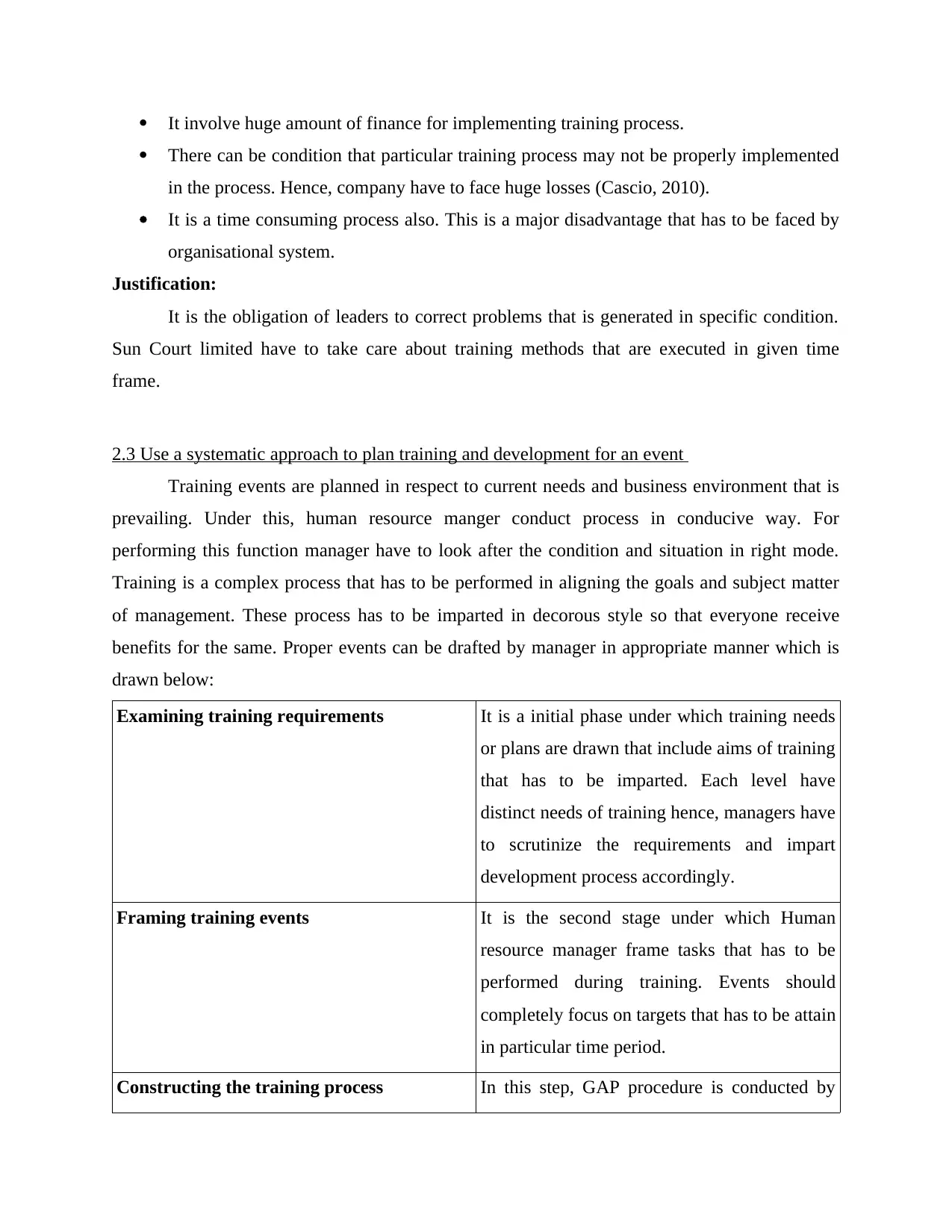
It involve huge amount of finance for implementing training process.
There can be condition that particular training process may not be properly implemented
in the process. Hence, company have to face huge losses (Cascio, 2010).
It is a time consuming process also. This is a major disadvantage that has to be faced by
organisational system.
Justification:
It is the obligation of leaders to correct problems that is generated in specific condition.
Sun Court limited have to take care about training methods that are executed in given time
frame.
2.3 Use a systematic approach to plan training and development for an event
Training events are planned in respect to current needs and business environment that is
prevailing. Under this, human resource manger conduct process in conducive way. For
performing this function manager have to look after the condition and situation in right mode.
Training is a complex process that has to be performed in aligning the goals and subject matter
of management. These process has to be imparted in decorous style so that everyone receive
benefits for the same. Proper events can be drafted by manager in appropriate manner which is
drawn below:
Examining training requirements It is a initial phase under which training needs
or plans are drawn that include aims of training
that has to be imparted. Each level have
distinct needs of training hence, managers have
to scrutinize the requirements and impart
development process accordingly.
Framing training events It is the second stage under which Human
resource manager frame tasks that has to be
performed during training. Events should
completely focus on targets that has to be attain
in particular time period.
Constructing the training process In this step, GAP procedure is conducted by
There can be condition that particular training process may not be properly implemented
in the process. Hence, company have to face huge losses (Cascio, 2010).
It is a time consuming process also. This is a major disadvantage that has to be faced by
organisational system.
Justification:
It is the obligation of leaders to correct problems that is generated in specific condition.
Sun Court limited have to take care about training methods that are executed in given time
frame.
2.3 Use a systematic approach to plan training and development for an event
Training events are planned in respect to current needs and business environment that is
prevailing. Under this, human resource manger conduct process in conducive way. For
performing this function manager have to look after the condition and situation in right mode.
Training is a complex process that has to be performed in aligning the goals and subject matter
of management. These process has to be imparted in decorous style so that everyone receive
benefits for the same. Proper events can be drafted by manager in appropriate manner which is
drawn below:
Examining training requirements It is a initial phase under which training needs
or plans are drawn that include aims of training
that has to be imparted. Each level have
distinct needs of training hence, managers have
to scrutinize the requirements and impart
development process accordingly.
Framing training events It is the second stage under which Human
resource manager frame tasks that has to be
performed during training. Events should
completely focus on targets that has to be attain
in particular time period.
Constructing the training process In this step, GAP procedure is conducted by
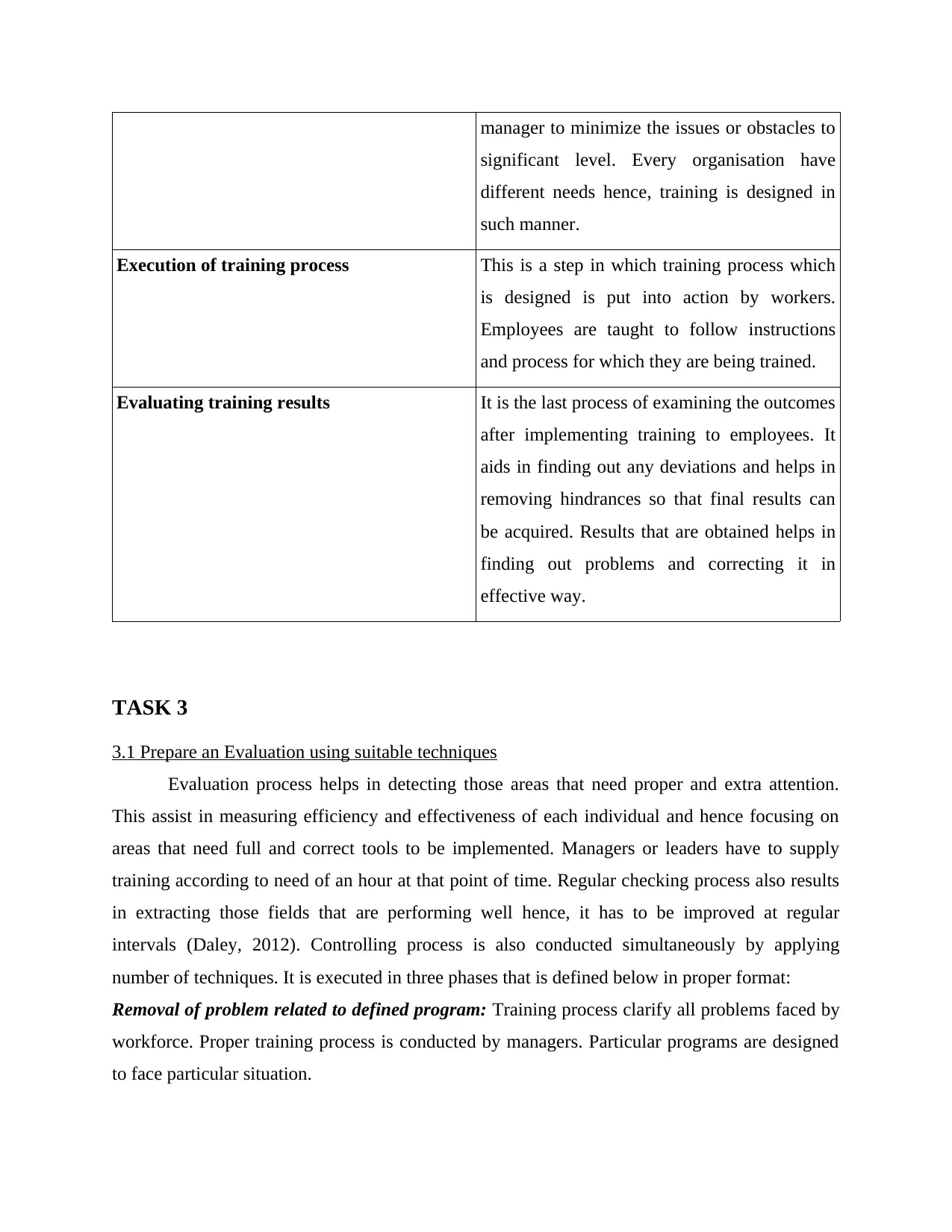
manager to minimize the issues or obstacles to
significant level. Every organisation have
different needs hence, training is designed in
such manner.
Execution of training process This is a step in which training process which
is designed is put into action by workers.
Employees are taught to follow instructions
and process for which they are being trained.
Evaluating training results It is the last process of examining the outcomes
after implementing training to employees. It
aids in finding out any deviations and helps in
removing hindrances so that final results can
be acquired. Results that are obtained helps in
finding out problems and correcting it in
effective way.
TASK 3
3.1 Prepare an Evaluation using suitable techniques
Evaluation process helps in detecting those areas that need proper and extra attention.
This assist in measuring efficiency and effectiveness of each individual and hence focusing on
areas that need full and correct tools to be implemented. Managers or leaders have to supply
training according to need of an hour at that point of time. Regular checking process also results
in extracting those fields that are performing well hence, it has to be improved at regular
intervals (Daley, 2012). Controlling process is also conducted simultaneously by applying
number of techniques. It is executed in three phases that is defined below in proper format:
Removal of problem related to defined program: Training process clarify all problems faced by
workforce. Proper training process is conducted by managers. Particular programs are designed
to face particular situation.
significant level. Every organisation have
different needs hence, training is designed in
such manner.
Execution of training process This is a step in which training process which
is designed is put into action by workers.
Employees are taught to follow instructions
and process for which they are being trained.
Evaluating training results It is the last process of examining the outcomes
after implementing training to employees. It
aids in finding out any deviations and helps in
removing hindrances so that final results can
be acquired. Results that are obtained helps in
finding out problems and correcting it in
effective way.
TASK 3
3.1 Prepare an Evaluation using suitable techniques
Evaluation process helps in detecting those areas that need proper and extra attention.
This assist in measuring efficiency and effectiveness of each individual and hence focusing on
areas that need full and correct tools to be implemented. Managers or leaders have to supply
training according to need of an hour at that point of time. Regular checking process also results
in extracting those fields that are performing well hence, it has to be improved at regular
intervals (Daley, 2012). Controlling process is also conducted simultaneously by applying
number of techniques. It is executed in three phases that is defined below in proper format:
Removal of problem related to defined program: Training process clarify all problems faced by
workforce. Proper training process is conducted by managers. Particular programs are designed
to face particular situation.
⊘ This is a preview!⊘
Do you want full access?
Subscribe today to unlock all pages.

Trusted by 1+ million students worldwide
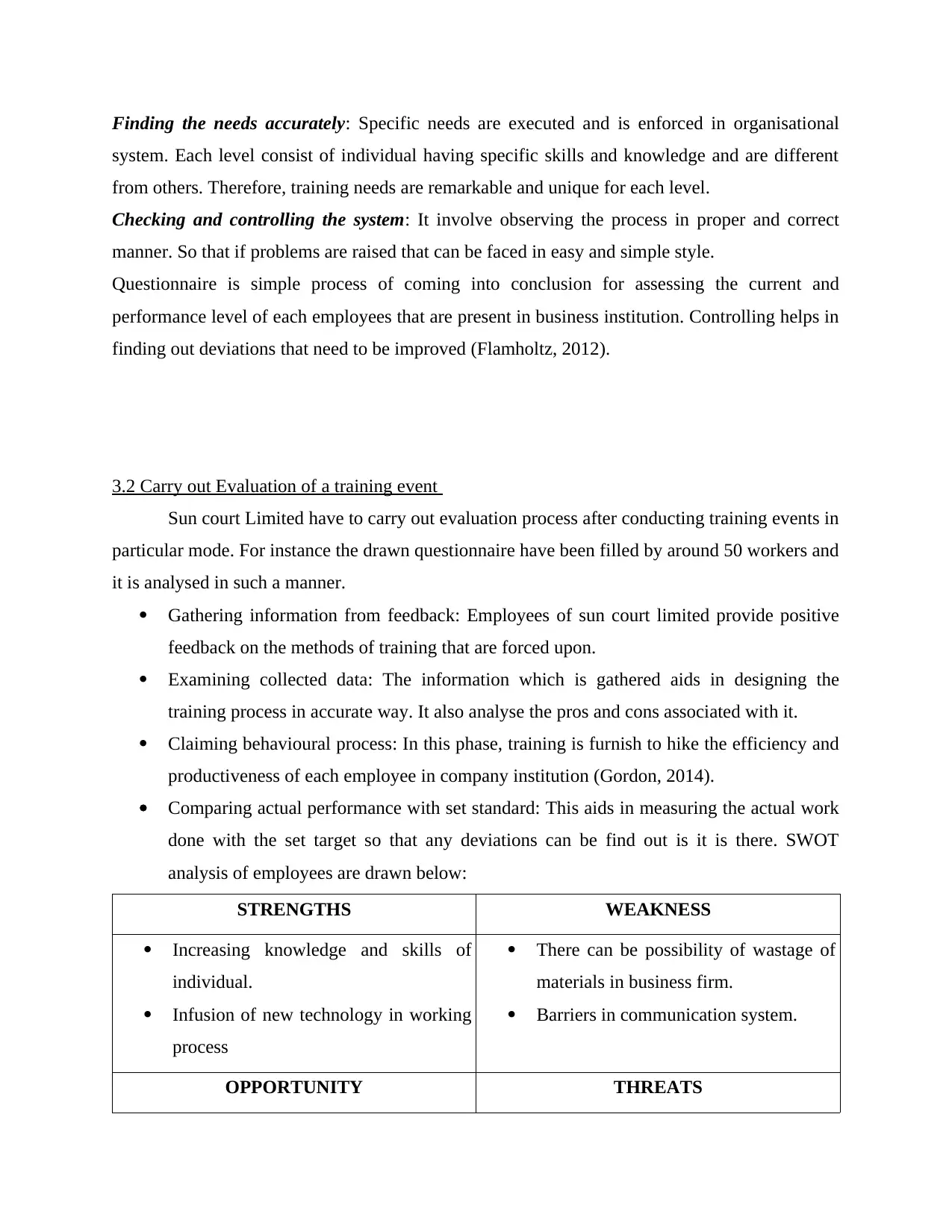
Finding the needs accurately: Specific needs are executed and is enforced in organisational
system. Each level consist of individual having specific skills and knowledge and are different
from others. Therefore, training needs are remarkable and unique for each level.
Checking and controlling the system: It involve observing the process in proper and correct
manner. So that if problems are raised that can be faced in easy and simple style.
Questionnaire is simple process of coming into conclusion for assessing the current and
performance level of each employees that are present in business institution. Controlling helps in
finding out deviations that need to be improved (Flamholtz, 2012).
3.2 Carry out Evaluation of a training event
Sun court Limited have to carry out evaluation process after conducting training events in
particular mode. For instance the drawn questionnaire have been filled by around 50 workers and
it is analysed in such a manner.
Gathering information from feedback: Employees of sun court limited provide positive
feedback on the methods of training that are forced upon.
Examining collected data: The information which is gathered aids in designing the
training process in accurate way. It also analyse the pros and cons associated with it.
Claiming behavioural process: In this phase, training is furnish to hike the efficiency and
productiveness of each employee in company institution (Gordon, 2014).
Comparing actual performance with set standard: This aids in measuring the actual work
done with the set target so that any deviations can be find out is it is there. SWOT
analysis of employees are drawn below:
STRENGTHS WEAKNESS
Increasing knowledge and skills of
individual.
Infusion of new technology in working
process
There can be possibility of wastage of
materials in business firm.
Barriers in communication system.
OPPORTUNITY THREATS
system. Each level consist of individual having specific skills and knowledge and are different
from others. Therefore, training needs are remarkable and unique for each level.
Checking and controlling the system: It involve observing the process in proper and correct
manner. So that if problems are raised that can be faced in easy and simple style.
Questionnaire is simple process of coming into conclusion for assessing the current and
performance level of each employees that are present in business institution. Controlling helps in
finding out deviations that need to be improved (Flamholtz, 2012).
3.2 Carry out Evaluation of a training event
Sun court Limited have to carry out evaluation process after conducting training events in
particular mode. For instance the drawn questionnaire have been filled by around 50 workers and
it is analysed in such a manner.
Gathering information from feedback: Employees of sun court limited provide positive
feedback on the methods of training that are forced upon.
Examining collected data: The information which is gathered aids in designing the
training process in accurate way. It also analyse the pros and cons associated with it.
Claiming behavioural process: In this phase, training is furnish to hike the efficiency and
productiveness of each employee in company institution (Gordon, 2014).
Comparing actual performance with set standard: This aids in measuring the actual work
done with the set target so that any deviations can be find out is it is there. SWOT
analysis of employees are drawn below:
STRENGTHS WEAKNESS
Increasing knowledge and skills of
individual.
Infusion of new technology in working
process
There can be possibility of wastage of
materials in business firm.
Barriers in communication system.
OPPORTUNITY THREATS
Paraphrase This Document
Need a fresh take? Get an instant paraphrase of this document with our AI Paraphraser
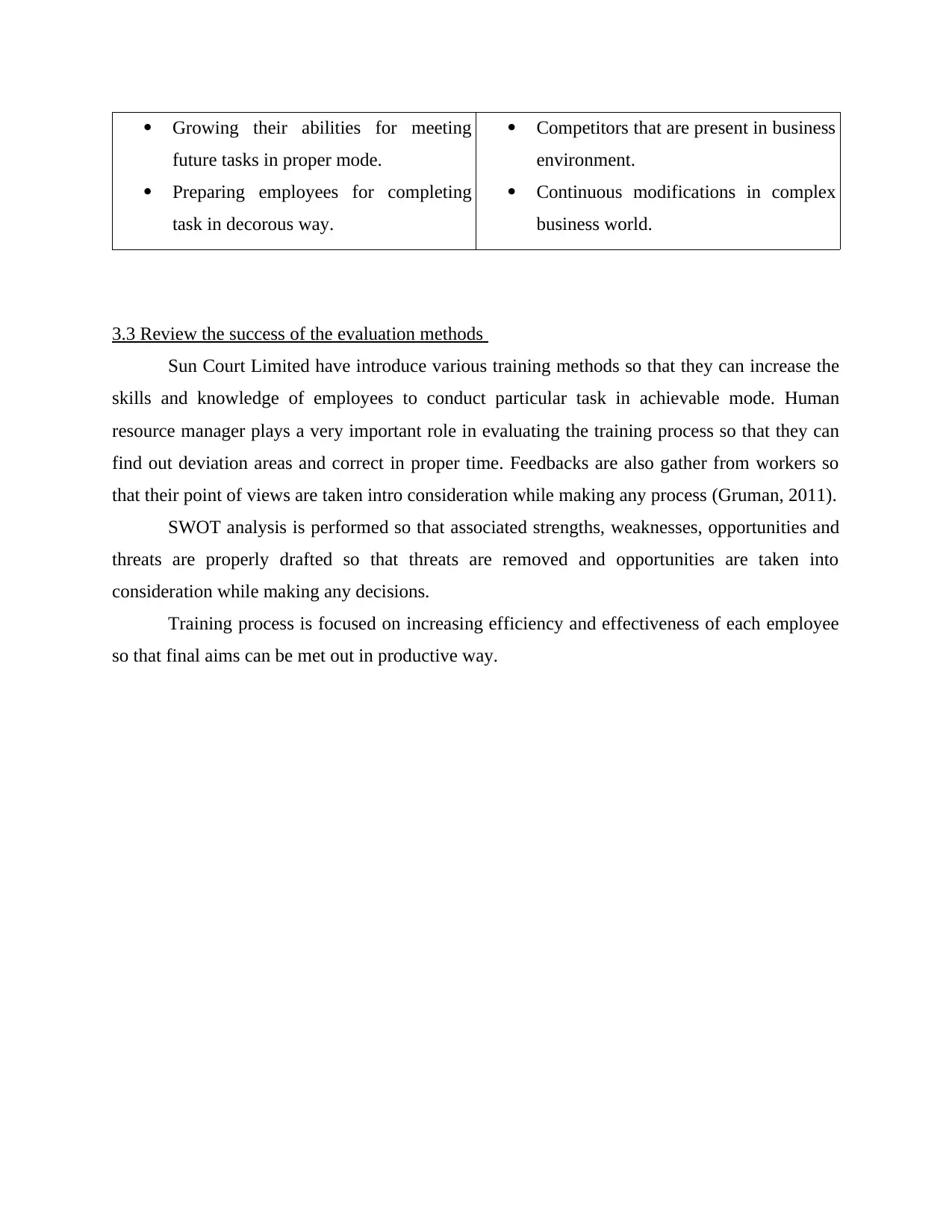
Growing their abilities for meeting
future tasks in proper mode.
Preparing employees for completing
task in decorous way.
Competitors that are present in business
environment.
Continuous modifications in complex
business world.
3.3 Review the success of the evaluation methods
Sun Court Limited have introduce various training methods so that they can increase the
skills and knowledge of employees to conduct particular task in achievable mode. Human
resource manager plays a very important role in evaluating the training process so that they can
find out deviation areas and correct in proper time. Feedbacks are also gather from workers so
that their point of views are taken intro consideration while making any process (Gruman, 2011).
SWOT analysis is performed so that associated strengths, weaknesses, opportunities and
threats are properly drafted so that threats are removed and opportunities are taken into
consideration while making any decisions.
Training process is focused on increasing efficiency and effectiveness of each employee
so that final aims can be met out in productive way.
future tasks in proper mode.
Preparing employees for completing
task in decorous way.
Competitors that are present in business
environment.
Continuous modifications in complex
business world.
3.3 Review the success of the evaluation methods
Sun Court Limited have introduce various training methods so that they can increase the
skills and knowledge of employees to conduct particular task in achievable mode. Human
resource manager plays a very important role in evaluating the training process so that they can
find out deviation areas and correct in proper time. Feedbacks are also gather from workers so
that their point of views are taken intro consideration while making any process (Gruman, 2011).
SWOT analysis is performed so that associated strengths, weaknesses, opportunities and
threats are properly drafted so that threats are removed and opportunities are taken into
consideration while making any decisions.
Training process is focused on increasing efficiency and effectiveness of each employee
so that final aims can be met out in productive way.
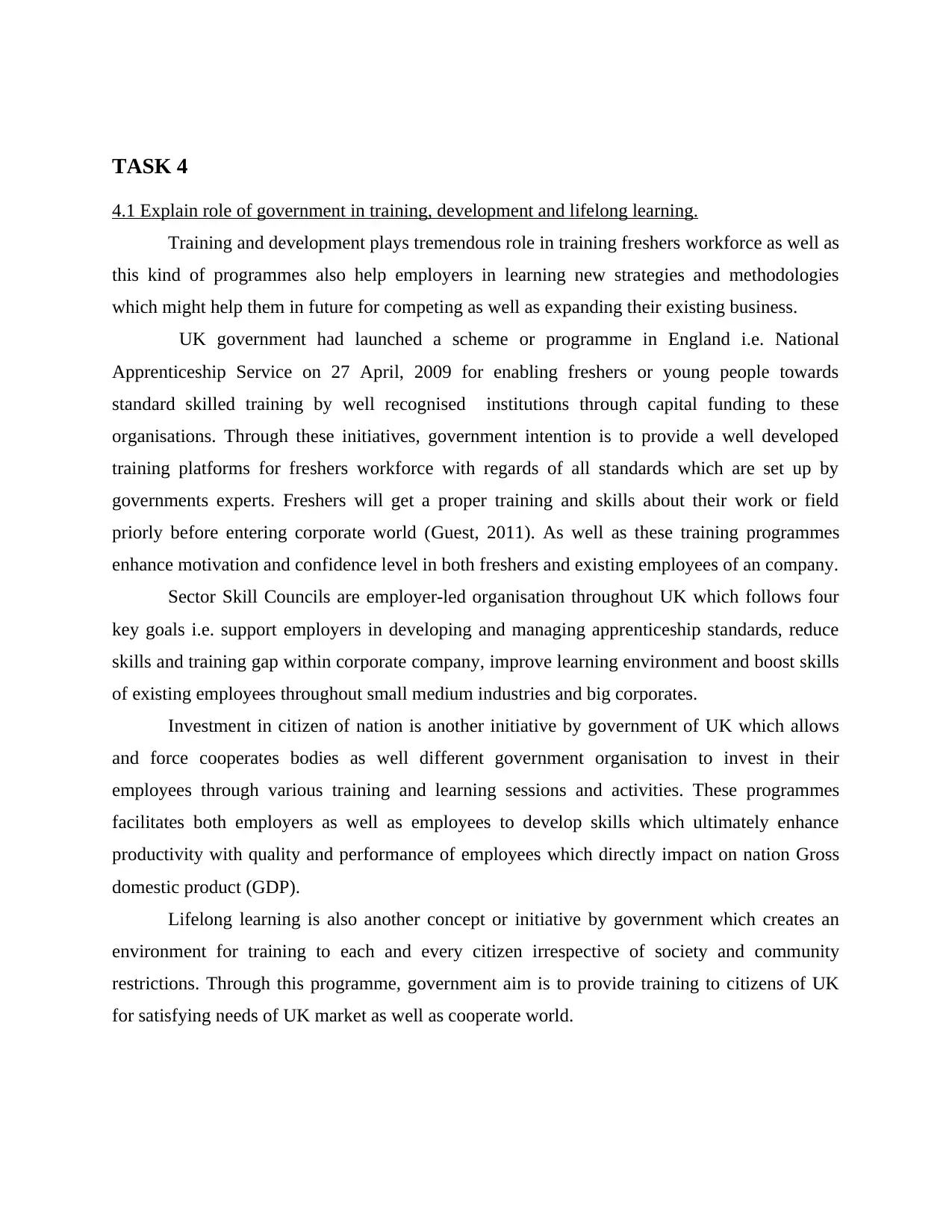
TASK 4
4.1 Explain role of government in training, development and lifelong learning.
Training and development plays tremendous role in training freshers workforce as well as
this kind of programmes also help employers in learning new strategies and methodologies
which might help them in future for competing as well as expanding their existing business.
UK government had launched a scheme or programme in England i.e. National
Apprenticeship Service on 27 April, 2009 for enabling freshers or young people towards
standard skilled training by well recognised institutions through capital funding to these
organisations. Through these initiatives, government intention is to provide a well developed
training platforms for freshers workforce with regards of all standards which are set up by
governments experts. Freshers will get a proper training and skills about their work or field
priorly before entering corporate world (Guest, 2011). As well as these training programmes
enhance motivation and confidence level in both freshers and existing employees of an company.
Sector Skill Councils are employer-led organisation throughout UK which follows four
key goals i.e. support employers in developing and managing apprenticeship standards, reduce
skills and training gap within corporate company, improve learning environment and boost skills
of existing employees throughout small medium industries and big corporates.
Investment in citizen of nation is another initiative by government of UK which allows
and force cooperates bodies as well different government organisation to invest in their
employees through various training and learning sessions and activities. These programmes
facilitates both employers as well as employees to develop skills which ultimately enhance
productivity with quality and performance of employees which directly impact on nation Gross
domestic product (GDP).
Lifelong learning is also another concept or initiative by government which creates an
environment for training to each and every citizen irrespective of society and community
restrictions. Through this programme, government aim is to provide training to citizens of UK
for satisfying needs of UK market as well as cooperate world.
4.1 Explain role of government in training, development and lifelong learning.
Training and development plays tremendous role in training freshers workforce as well as
this kind of programmes also help employers in learning new strategies and methodologies
which might help them in future for competing as well as expanding their existing business.
UK government had launched a scheme or programme in England i.e. National
Apprenticeship Service on 27 April, 2009 for enabling freshers or young people towards
standard skilled training by well recognised institutions through capital funding to these
organisations. Through these initiatives, government intention is to provide a well developed
training platforms for freshers workforce with regards of all standards which are set up by
governments experts. Freshers will get a proper training and skills about their work or field
priorly before entering corporate world (Guest, 2011). As well as these training programmes
enhance motivation and confidence level in both freshers and existing employees of an company.
Sector Skill Councils are employer-led organisation throughout UK which follows four
key goals i.e. support employers in developing and managing apprenticeship standards, reduce
skills and training gap within corporate company, improve learning environment and boost skills
of existing employees throughout small medium industries and big corporates.
Investment in citizen of nation is another initiative by government of UK which allows
and force cooperates bodies as well different government organisation to invest in their
employees through various training and learning sessions and activities. These programmes
facilitates both employers as well as employees to develop skills which ultimately enhance
productivity with quality and performance of employees which directly impact on nation Gross
domestic product (GDP).
Lifelong learning is also another concept or initiative by government which creates an
environment for training to each and every citizen irrespective of society and community
restrictions. Through this programme, government aim is to provide training to citizens of UK
for satisfying needs of UK market as well as cooperate world.
⊘ This is a preview!⊘
Do you want full access?
Subscribe today to unlock all pages.

Trusted by 1+ million students worldwide
1 out of 17
Related Documents
Your All-in-One AI-Powered Toolkit for Academic Success.
+13062052269
info@desklib.com
Available 24*7 on WhatsApp / Email
![[object Object]](/_next/static/media/star-bottom.7253800d.svg)
Unlock your academic potential
Copyright © 2020–2026 A2Z Services. All Rights Reserved. Developed and managed by ZUCOL.





